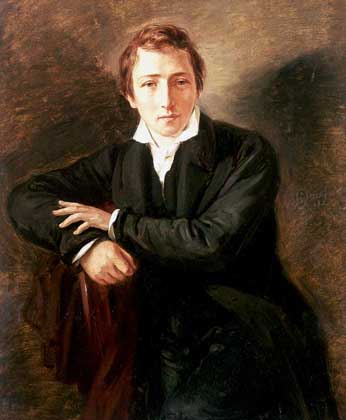The directory «Plots»
Heine Heinrich
(1797–1856)

German poet, b. Düsseldorf, of a Jewish family. One of the greatest of German lyric poets, he had a varied career. After failing in business he tried law but found it uncongenial and finally turned to history and literature. His first published poems and plays established him as a young romantic. In the literary salon of Rahel Varnhagen von Ense he met, among others, Fouqué, Chamisso, Hoffmann, Grabbe, and Immermann; some of these became life-long friends, others bitter enemies. Disillusioned with Germany and in political disgrace because of his liberal sympathies, he left for Paris (1831), where he supported the social ideals of the French Revolution, becoming for a time a Saint-Simonist. As the towering figure of the revolutionary literary movement Young Germany, he continued from Paris to disseminate French revolutionary ideas in Germany. He received a French government pension, worked as correspondent for German newspapers, and died after years of severe illness, during which he was nursed by his faithful “Mouche” (who used the pen name Camille Selden). Heine’s writing reflects the dualism of his nature; it shows strong influences of both classic and romantic German literature. Despite a conversion to Christianity, Jewish themes frequently figure in his works, as does the influence of English and French literature. His Buch der Lieder (1827, tr. Book of Songs, 1846), which contains the lyric cycles “Nordsee” and “Lyrisches Intermezzo,” shows his indebtedness to the romantic folk-song poets. Other collections of poems are Neue Gedichte (1847), Romanzero (1851), and Letzte Gedichte (1853). Schumann composed music for Heine’s poems, as did Schubert, Mendelssohn, Liszt, and many others. His lyrics have been used in more than 3,000 compositions, the most popular perhaps being “Die Lorelei,” with melody by Friedrich Silcher (1789–1860). Heine’s later poems and especially his prose works established him as a satirist of barbed wit and as an embittered critic of romanticism, of jingoistic patriotism, and of current social and political affairs. Most poignant are Die Harzreise [Harz journey] (1826) and Reisebilder [travel pictures] (1827–31), which combine poetry and prose. Atta Troll (1843) and Deutschland (1844) reflect his reaction to German anti-Semitism, as do his earliest dramatic work, Almansor, and an unfinished novel, Der Rabbi von Bacharach. Possibly because of their cosmopolitan character, Heine’s works have never been as popular in Germany as they have in other lands. Virtually all of Heine’s works have been translated into English, notably by E. A. Bowring, Havelock Ellis, C. G. Leland, Louis Untermeyer, and Humbert Wolfe.
Bulgaria, 1956, Heinrich Heine
Cuba, 1967, Gizelle
Cuba, 1976, «Giselle»
Cuba, 2003, Alicia Alonso as Giselle
Cuba, 2008, «Giselle»
DDR, 1956, Heinrich Heine
DDR, 1956, Heinrich Heine
DDR, 1972, Heinrich Heine
Finland, 1993, «Giselle»
German Federal Republic, 1956, Silhouette of Heine
German Federal Republic, 1972, Heinrich Heine
German Federal Republic, 1997, Heinrich Heine
Germany. French Zone, 1945/1946, Heinrich Heine
Israel, 2001, Heinrich Heine
Kazakhstan, 2009, Zhizel, Don Quixote, Bahchisarayskiy Fountain, Legend about love
Rumania, 1956, Heinrich Heine
Russia, 1996, Scene from ballet «Giselle»
Seychelles, 1986, «Giselle»
Seychelles, 1986, Male dancer
Seychelles, 1986, Das de deux
Tanzania, 1999, «Giselle»
USSR, 1956, Heinrich Heine
DDR, 1956.12.17,  Berlin. Heinrich Heine
Berlin. Heinrich Heine
DDR, 1972.12.05,  Berlin. Heinrich Heine
Berlin. Heinrich Heine
German Federal Republic, 1956.12.17,  Bonn. Heinrich Heine
Bonn. Heinrich Heine
German Federal Republic, 1972.12.13,  Dusselorf. Heine
Dusselorf. Heine
German Federal Republic, 1997.11.06,  Bonn. Heinrich Heine
Bonn. Heinrich Heine
Russia, 2001,  Scene from ballet «Gizelle»
Scene from ballet «Gizelle»
DDR, 1981,  Heine's book on Esperanto
Heine's book on Esperanto